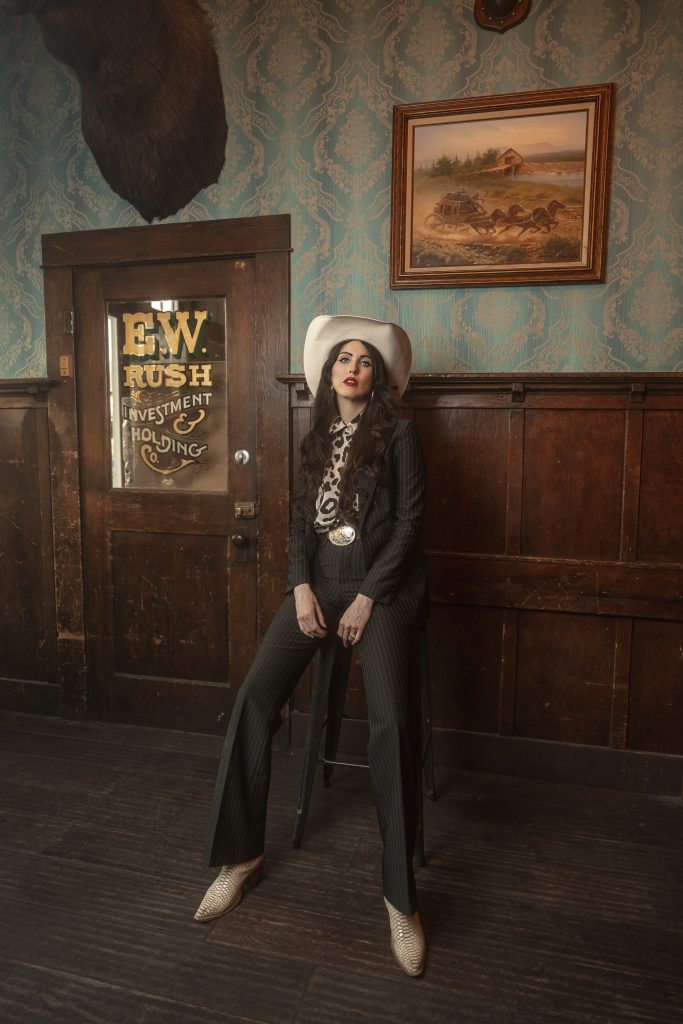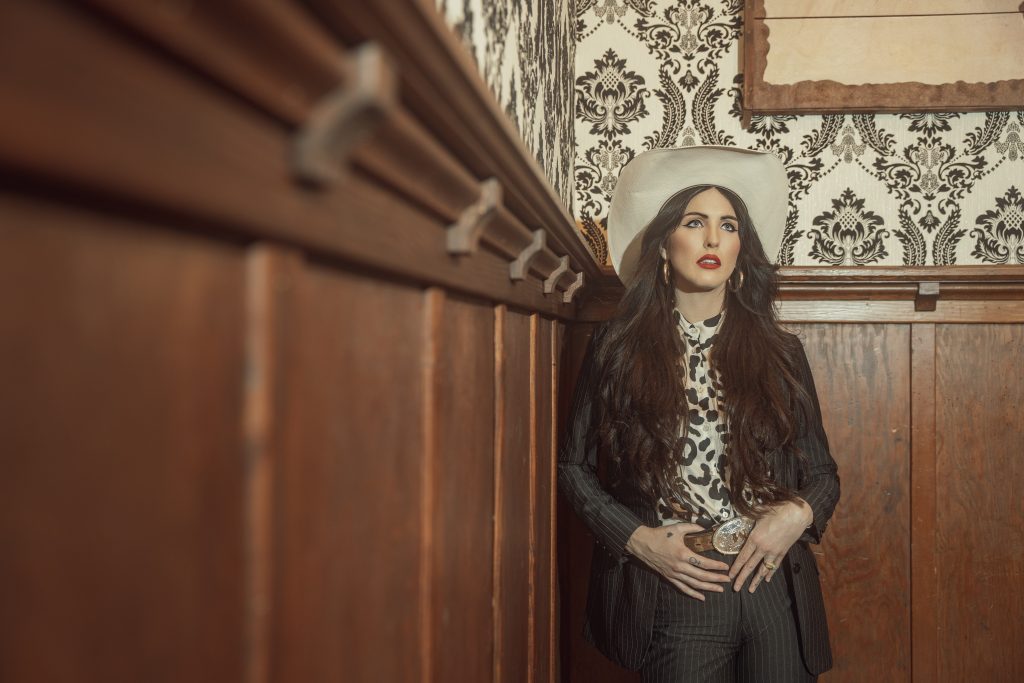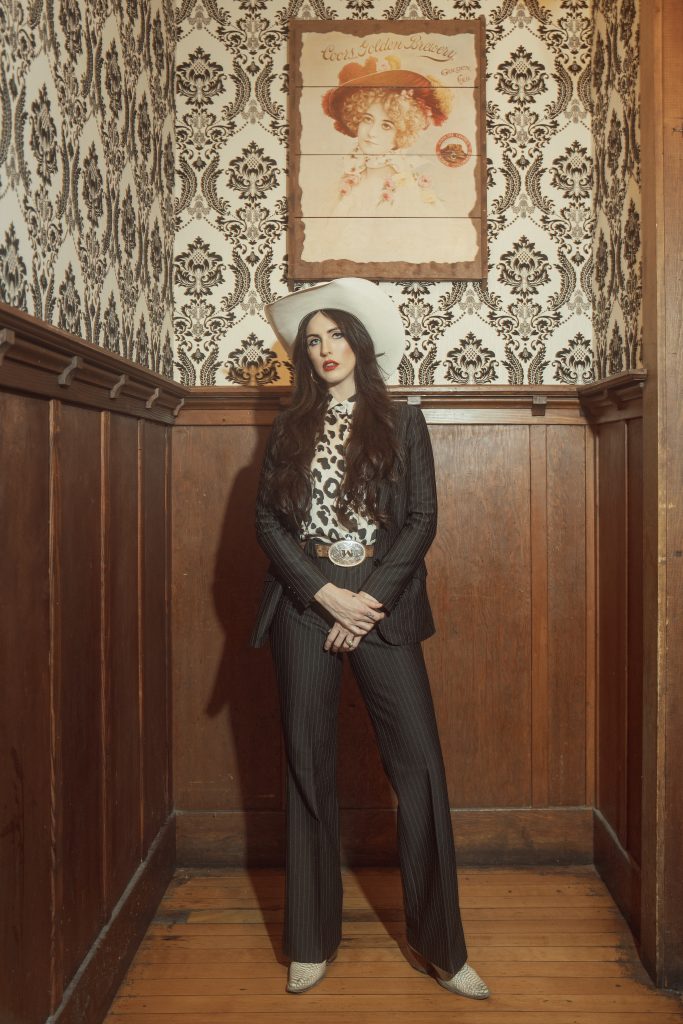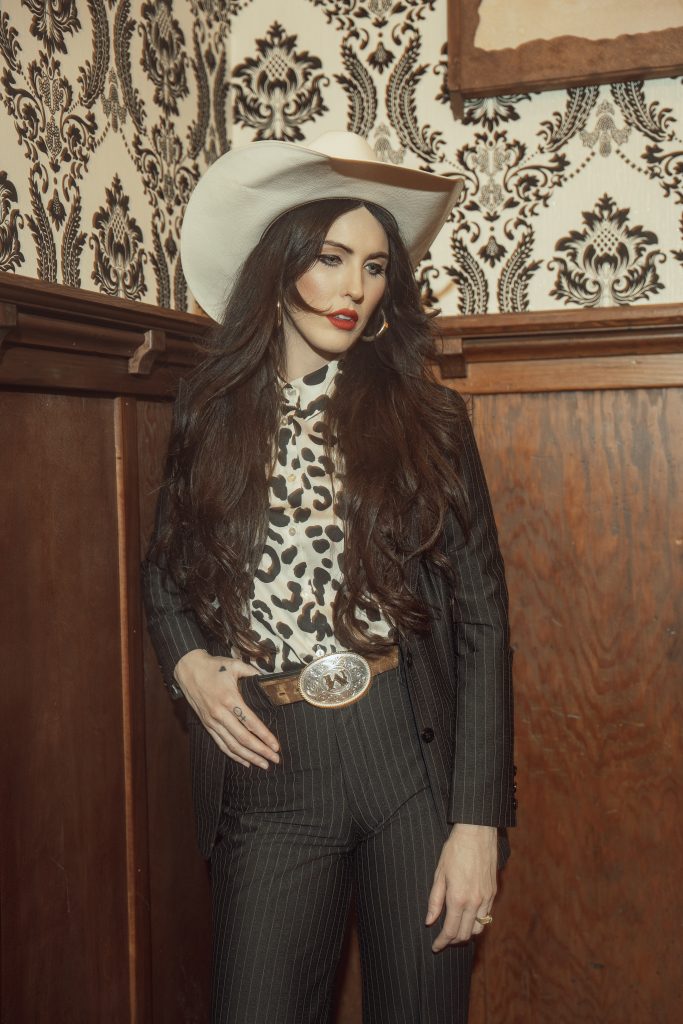Barreling Down Life’s Queer Highway with Jaime Wyatt
By Chris Bogard
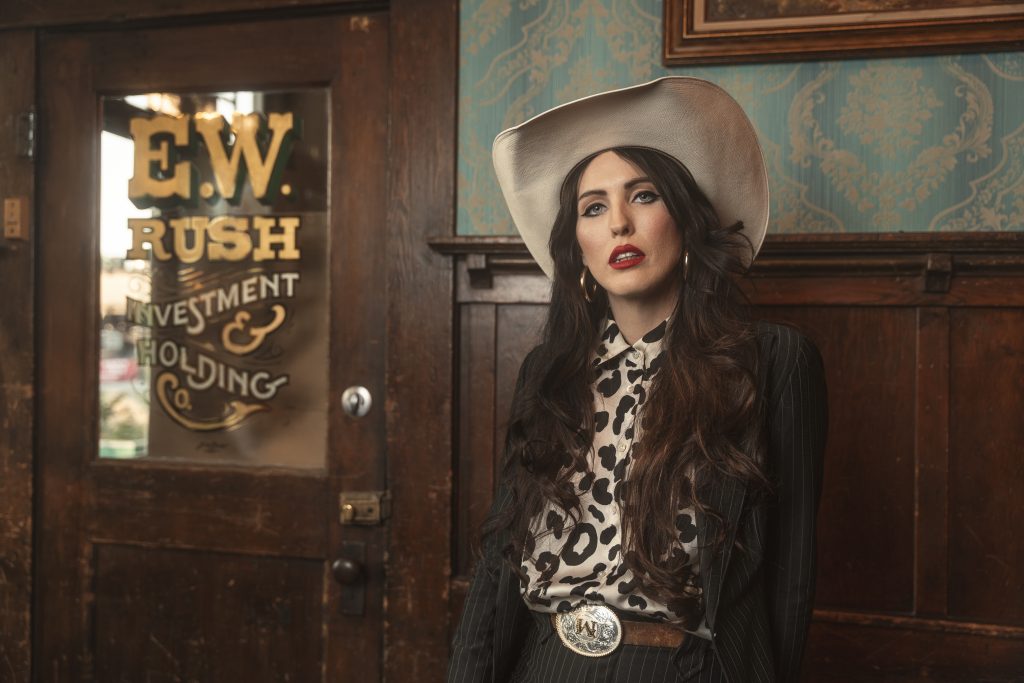
Jaime Wyatt’s an open book. Mostly.
Country music has always been about telling stories, and Wyatt is a fantastic storyteller. A modern Americana artist with plenty of vintage outlaw flair, Wyatt writes from her own experiences with unusual candor—a stint in prison, addiction and recovery, her struggles with mental health. If 2017’s Felony Blues covered her compelling backstory, Neon Cross (2020) proved that she’s still got plenty of ideas.
And they keep coming. In fact, Wyatt’s just getting started. As she told us while calling on a long drive between gigs, lately she’s been moved to write about the boiling cultural climate in this country and, maybe for the first time, about her own love life—it’s one topic she’s kept close to her vest. She also shared some childhood memories, talked about her struggle to come out, and stressed the importance of queer visibility.
It’s been a bumpy few months for Jaime Wyatt—a tough battle with COVID, a car wreck, and the passing of a close friend have made this past summer more challenging than most, but she’s been through worse. In the wake of all that, she’s keeping busy, playing as many shows as she can, hitting all the festivals, and gearing up to record new music.
I had the pleasure of taking some portraits of her when she performed at Folsom, before her summer took that difficult turn. They’re seen here, exclusively at Country Queer, for the first time.
Country music is evolving. And – supposedly, hopefully – becoming more accepting of queer people. What’s been your experience in that regard? Have you come up against any outright oppressive behavior?
You know, it’s definitely better now. Much respect to the queer people that came before me, and the battles they fought for things to evolve and progress and get better. I’ve mostly experienced acceptance.
There’s lots of people that just love the music, and they just want to talk about that, and they don’t acknowledge anything else in your life. They’d be like, ‘What does it matter who they’ve been down with?’ I’ve had loads of write-ups from super punchy publications like that. ‘Why does it matter?’ And, well, it does matter, because you already assumed that I’m heterosexual… and while the majority of people are, I want to be seen for who I am. I want to reach young people. So, visibility is important. I didn’t see anyone that looked like me when I was a young person. And not that looks matter… but style matters. I’m an artist, and so I like aesthetics, and it’s just that simple. I didn’t grow up in a town where queer people were accepted. So yeah, we’re gonna talk about who I am.
I’ve certainly had some straight up misdirected people say things like ‘Is that some gay shit you’re singing about?’ and like, ‘You can’t sing about that.’ I’ve literally had that said to me. But you know, it’s so much better than it ever was. And I just think that’s because society is coming around. They have to. The younger generation is so accepting and so understanding and it’s a non-issue, you know what I mean? It’s actually normal, which is as it should have been all along. And so older people are having to sort of like, you know, actually not be assholes as much as they used to be.
It’s definitely an exciting time to be queer… so much acceptance on the one hand and a backlash of oppression on the other. And country music has become an unusual cultural intersection for all this.
Can you tell us a little about your coming out story? Was there any sort of significant moment when you realized that you were queer?
Well, I’ve known I was queer since I was a young child, and then I quickly learned that it wasn’t accepted where I grew up. So I had an idea of it.
But then when I was 18, I was out just to certain people, and I’d date women. I came out about ten years later because I couldn’t stand it anymore. I had buried my true identity so deeply, you know… I’m sort of complicated. We’re all complicated, okay, but my story has a lot of addiction in it. I went to jail for eight months, and then I went into a halfway house for six months after that. And I was on felony probation. I got sober that way. And that saved my life. But then when I got sober, I was like, I just need to be good. I just need to be good. I felt so ashamed. And somehow ‘good’ became equated with conforming to a hetero-normative lifestyle. And a few years later, I got married to a man and I did all the mental health stuff—going to therapy, working out, I went to meetings, I sponsored women. I did everything I thought I was supposed to and I still felt so empty. I had this husband who was my best friend, but I was like, ‘Why do I feel so empty?’
And one day it dawned on me, when I was in Silver Lake. I actually finally saw queer people that resembled me. And it clicked. You know? So it took a long time. Really long time. I was distracted by a lot of things and drugs and alcohol really slowed that process. But I think also, trauma slowed the process when I was a child, it just stunted that development.
Silver Lake… in Los Angeles?
Yes.
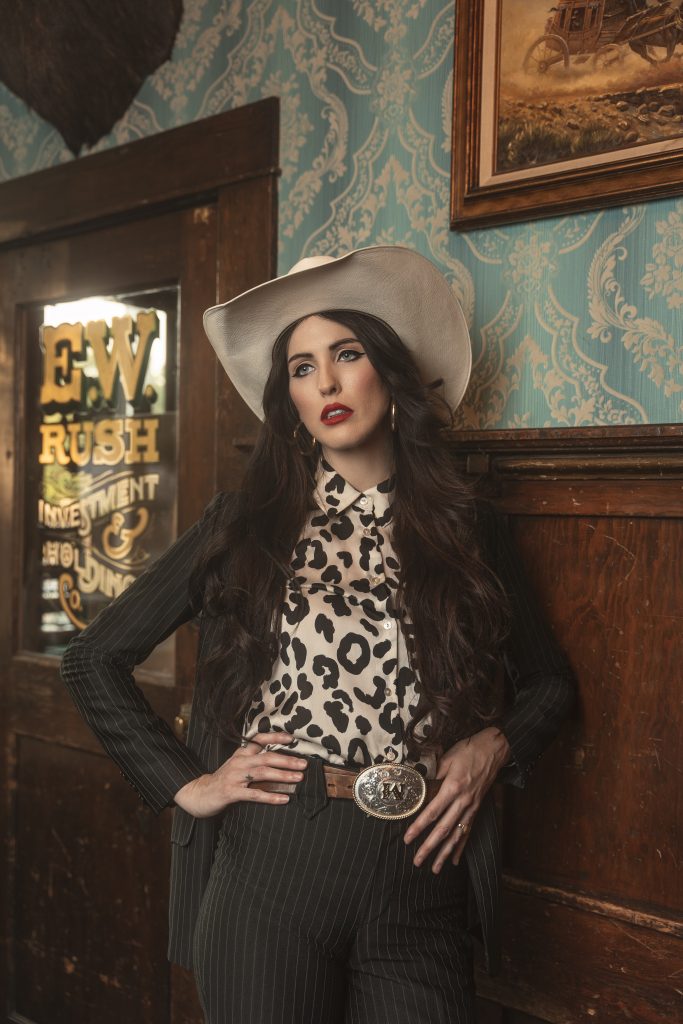
So, you spent some time out there and that helped spark that ‘aha!’ moment for you?
Oh, yeah. Saved my life. Saved my life. And that’s why visibility matters. Because I figured out what was missing.
Did you grow up around country music?
I did. You know, it’s so funny… I had a guy, a straight white man, come up to the merch booth the other day and do the standard—I’ve had this happen a lot: they grill me about what I know about country. ‘Where are you from? How did you find country?’
I tell them I grew up in Washington State, in the Pacific Northwest. I tell them I grew up with horses, working at horse barns and stuff. And then they wanna know, ‘Well, is there any ranching out there?’ And I’m like, ‘Not really.” My parents had rescued horses, because they wanted their kids growing up around animals and doing outdoor stuff, you know, being in nature and being with animals. And so I grew up around the barn.
My introduction to country was through my parents, who loved old country, and from hearing it at the bar. I just was really taken aback by country songwriting, and how everyone wanted to sing along to those songs. They’d still play older country on the radio in Washington. They’re still playing like, The Judds. I went to see The Judds at the county fair. And my sister was a barrel racer. And so we went to all the county fairs where she competed riding horses, and I rode horses a little as a child, too, and I love animals, but I got more into skateboarding. And riding my bike. I was a little nerdy.
My parents loved what we called alternative country, alt-country. My mom turned me onto Lucinda Williams, and my dad turned me onto Steve Earle, which I felt was the coolest kind of music there was, you know? And that’s just that, the story hasn’t changed. Later, I got into the Rolling Stones, and I like the way they do country also.
At your show in Folsom this summer, you talked about your dad a little bit before covering the Grateful Dead… didn’t you say he was a musician as well?
Yeah, my parents were both singers and songwriters. But my mom was at home with her kids, so she mostly sang back up for my dad. In the 80s, my dad had some development deals with labels in Los Angeles. He was always writing and he became friends with Bob Weir, and they carried that friendship on for… I don’t know, maybe like ten to twenty years or something. And I grew up going to concerts. So when the Grateful Dead came around, I would always be backstage. And Bob was always coming over to our house.
It was good to grow up around music constantly being made. My parents split when I was very young, but my early, early years were around concerts and around musicians and… spying on my dad’s band rehearsals and playing tambourine to it in the other room. Music was a huge part of our life together and we always sang songs. My dad would make up games with rhyming and making up songs all the time.
So it must have felt natural for you to start making your own music, right?
Absolutely. I think my parents knew I was drawn to it. When I was like four, I was writing songs and singing them to the family and playing harmonica all the time. And they’d laugh, of course. Every little kid picks up harmonica, but I guess I was good at it. I still play harmonica today. But they just kept giving me instruments and encouraging me. So it was a creative way to grow up. I didn’t learn about like, how to manage my checkbook or anything like that, but I did learn about music.
Do you have any new work that’s coming along? Are you writing?
I’m writing, yeah, have been… I was writing in the pandemic. And I’ve been writing the last few months and playing some new songs in our set now. And we’re talking to some pretty cool producers. I’d say within the next month we will decide who’ll produce and where we’re going to cut this record. So over winter, we’ll get it done.
What’s impacting your songwriting lately?
Lately I’m feeling moved by… society, I guess? My writing is impacted by whatever environment I’m in and I kind of gather a general message that I try and put across from that. Other times, it’s more personal.
After the way George Floyd’s death was publicized, civil rights and gun violence… I’ve been moved to write about what’s going on in our country. And I don’t consider those issues political—to me, they’re human rights issues. When people say, ‘Oh, too political’ I think, ‘Well—it depends.’ I mean, unless you’re literally singing about candidates you want to vote for, I don’t think many songs are truly political.
I also entered into a really amazing loving relationship, and I have some songs about that. That’s new territory for me, and it’s certainly been inspiring to write about. Just like, it’s simple, right? Love, when you write about it, can be simple. Can be. That’s been cool.
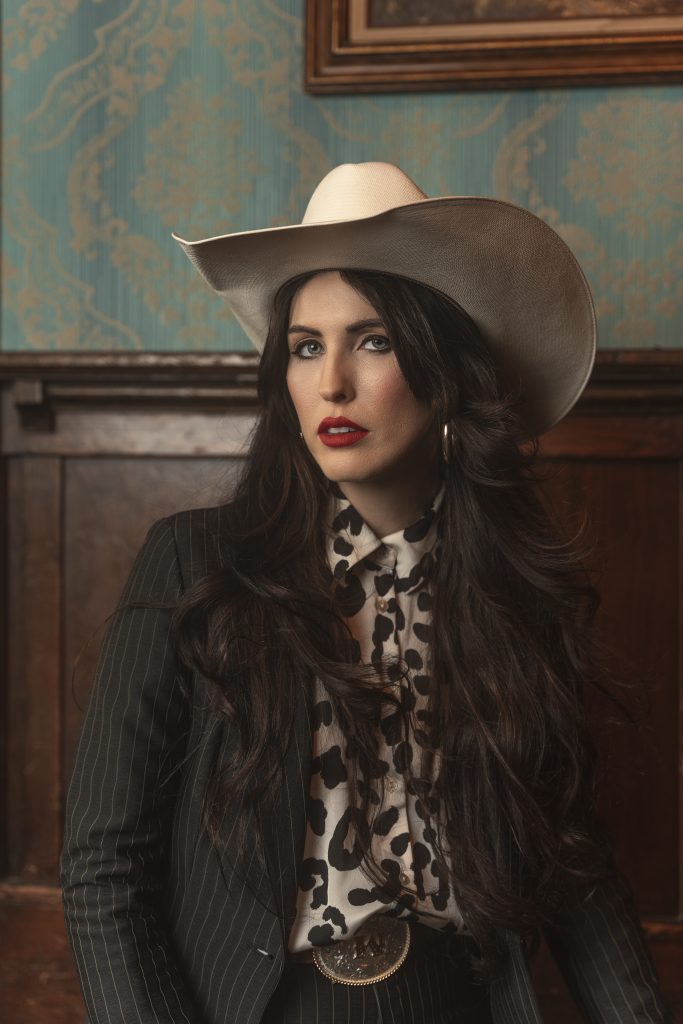
It’s always fun to see that shift in an artist’s work when there’s a shift in their love life. Kacey Musgraves for example, from Golden Hour to Star-Crossed, there’s definitely that shift there, from the honeymoon phase to the crash and burn.
She’s been super interesting to follow, and see the change and hear the change. That’s kind of a lesson for me, writing about good feelings too. I’ve always written about love from other people’s perspectives. Or like friendship-love, you know. But this is my love. And it’s… it’s new.
Chris Bogard is an artist and visual storyteller with a focus on queer subjects and themes, from drag queens to cowboys. Besides digital and film photography, Chris also enjoys leathercraft and live music.
